Related Research Articles
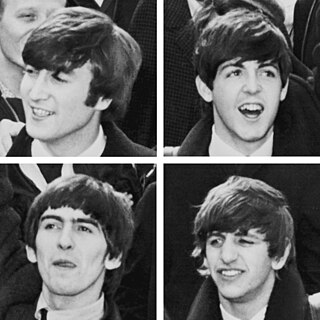
The Beatles were an English rock band formed in Liverpool in 1960, comprising John Lennon, Paul McCartney, George Harrison and Ringo Starr. They are regarded as the most influential band of all time and were integral to the development of 1960s counterculture and the recognition of popular music as an art form. Rooted in skiffle, beat and 1950s rock 'n' roll, their sound incorporated elements of classical music and traditional pop in innovative ways. The band also explored music styles ranging from folk and Indian music to psychedelia and hard rock. As pioneers in recording, songwriting and artistic presentation, the Beatles revolutionized many aspects of the music industry and were often publicized as leaders of the era's youth and sociocultural movements.
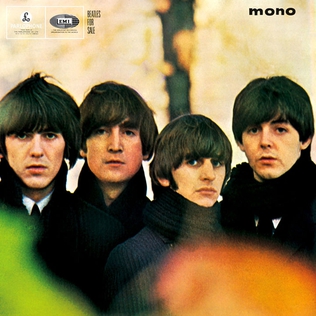
Beatles for Sale is the fourth studio album by the English rock band the Beatles. It was released on 4 December 1964 in the United Kingdom on EMI's Parlophone label. The album marked a departure from the upbeat tone that had characterised the Beatles' previous work, partly due to the band's exhaustion after a series of tours that had established them as a worldwide phenomenon in 1964. Beatles for Sale was not widely available in the US until 1987, when the Beatles' catalogue was standardised for release on CD. Instead, eight of the album's fourteen tracks appeared on Capitol Records' concurrent release, Beatles '65, issued in North America only.
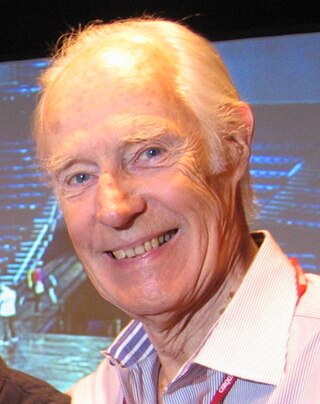
Sir George Henry Martin was an English record producer, arranger, composer, conductor, and musician. He was commonly referred to as the "fifth Beatle" because of his extensive involvement in each of the Beatles' original albums. Martin's formal musical expertise and interest in novel recording practices facilitated the group's rudimentary musical education and desire for new musical sounds to record. Most of their orchestral and string arrangements were written by Martin, and he played piano or keyboards on a number of their records. Their collaborations resulted in popular, highly acclaimed records with innovative sounds, such as the 1967 album Sgt. Pepper's Lonely Hearts Club Band—the first rock album to win a Grammy Award for Album of the Year.

The Quarrymen are a British skiffle/rock and roll group, formed by John Lennon in Liverpool in 1956, which evolved into the Beatles in 1960. Originally consisting of Lennon and several school friends, the Quarrymen took their name from a line in the school song of their school, the Quarry Bank High School. Lennon's mother, Julia, taught her son to play the banjo, showed Lennon and Eric Griffiths how to tune their guitars in a similar way to the banjo, and taught them simple chords and songs.

Top of the Pops (TOTP) is a British music chart television programme, made by the BBC and broadcast weekly between 1 January 1964 and 30 July 2006. The programme was the world's longest-running weekly music show. For most of its history, it was broadcast on Thursday evenings on BBC One. Each show consisted of performances of some of the week's best-selling popular music records, usually excluding any tracks moving down the chart, including a rundown of that week's singles chart. This was originally the Top 20, though this varied throughout the show's history. The Top 30 was used from 1969, and the Top 40 from 1984.

Live! at the Star-Club in Hamburg, Germany; 1962 is a double album featuring live performances by the English rock band the Beatles, recorded in late December 1962 at the Star-Club during their final Hamburg residency. The album was released in 1977 in two different versions, comprising a total of 30 songs by the Beatles.
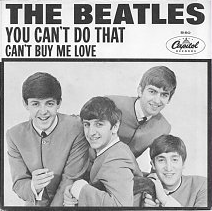
"You Can't Do That" is a song written by John Lennon and released by the English rock band the Beatles as the B-side of their sixth British single "Can't Buy Me Love". It was later released on their third UK album A Hard Day's Night (1964). A live rendition of the song was released on the 2016 re-release of The Beatles at the Hollywood Bowl.

"I Wanna Be Your Man" is a Lennon–McCartney-penned song first recorded and released as a single by the Rolling Stones, and then recorded by the Beatles for their second studio album With the Beatles. The song was primarily written by Paul McCartney, and finished by McCartney with John Lennon in the corner of a Richmond, London club while Mick Jagger and Keith Richards were talking.
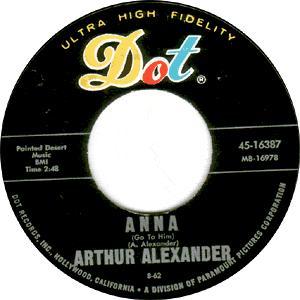
"Anna (Go to Him)", or simply "Anna", is a song written and originally recorded by Arthur Alexander. His version was released as a single by Dot Records on September 17, 1962. A cover version was performed by the Beatles and included on their 1963 debut album Please Please Me. A Spanish-language cover version was performed by Grupo Pegasso and included on their 1996 album Amor Vendido, Vol. 4, followed by an English version in 2019.

"Ask Me Why" is a song by the English rock band the Beatles originally released in the United Kingdom as the B-side of their single "Please Please Me". It was also included on their 1963 debut album Please Please Me. It was written primarily by John Lennon and credited to the Lennon–McCartney partnership.

"I'm a Loser" is a song by the English rock band the Beatles, originally released on Beatles for Sale in the United Kingdom, later released on Beatles '65 in the United States, both in 1964. Written by John Lennon, and credited to Lennon–McCartney, it was considered for release as a single until Lennon wrote "I Feel Fine".

"I'll Get You" is a song by the English rock band the Beatles, written by John Lennon and Paul McCartney, and released by the Beatles as the B-side of their 1963 single "She Loves You". The song was initially titled "Get You in the End".
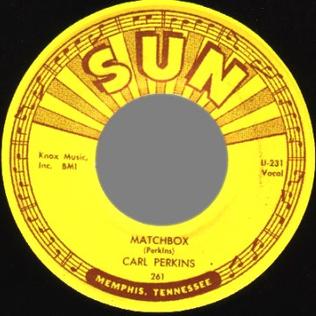
"Matchbox" is a song written and recorded by Carl Perkins and released in 1957. Blind Lemon Jefferson wrote and recorded a song entitled "Match Box Blues" in 1927, which is musically different but which contains some lyric phrases in common.
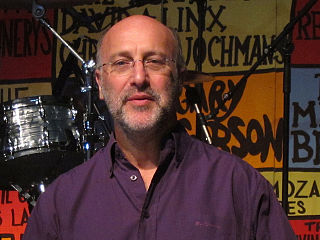
Mark Lewisohn is an English historian and biographer. Since the 1980s, he has written many reference books about the Beatles and has worked for EMI, MPL Communications and Apple Corps. He has been referred to as the world's leading authority on the band. His major works include The Complete Beatles Recording Sessions (1988), a history of the group's session dates, and The Beatles: All These Years (2013–present), a three-volume series intended as the group's most comprehensive biography.
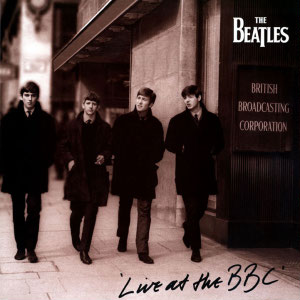
Live at the BBC is a 1994 compilation album featuring performances by the Beatles that were originally broadcast on various BBC Light Programme radio shows from 1963 to 1965. The mono album, available in multiple formats but most commonly as a two-CD set, consists of 56 songs and 13 tracks of dialogue; 30 of the songs had never been issued previously by the Beatles. It was the first official release by the Beatles of previously unreleased performances since The Beatles at the Hollywood Bowl in 1977 and the first containing previously unreleased songs since their final studio album, Let It Be, in 1970.
"Hippy Hippy Shake" is a song written and recorded by Chan Romero in 1959. That same year, it reached No. 3 in Australia. Romero was 17 years old when he wrote the song.

The Bonzo Dog Doo-Dah Band was created by a group of British art-school students in the 1960s. Combining elements of music hall, trad jazz and psychedelia with surreal humour and avant-garde art, the Bonzos came to public attention through appearances in the Beatles' 1967 film Magical Mystery Tour and the 1968 ITV comedy show Do Not Adjust Your Set.
The Beatles were a rock group from Liverpool, England. This timeline chronicles their activities.
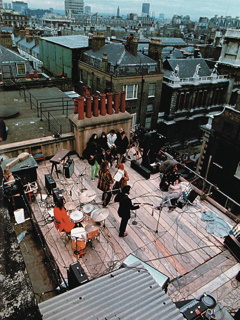
On 30 January 1969, the Beatles performed an impromptu concert from the rooftop of their Apple Corps headquarters at 3 Savile Row, in central London's office and fashion district. Joined by guest keyboardist Billy Preston, the band played a 42-minute set before the Metropolitan Police arrived and ordered them to reduce the volume. It was the final public performance of their career. They performed nine takes of five new songs as crowds of onlookers, many on lunch breaks, congregated in the streets and on the rooftops of nearby buildings to listen. The concert ended with "Get Back", and John Lennon joking, "I'd like to say thank you on behalf of the group and ourselves, and I hope we've passed the audition."
The first episode of Top of the Pops was broadcast on Wednesday, 1 January 1964, at 6:35pm.
References
- 1 2 3 Lewisohn 1992, pp. 110–111.
- 1 2 3 Wickman, Forrest (10 May 2013). "The Beatles Get Their Own Show". Slate . ISSN 1091-2339 . Retrieved 23 July 2023.
- ↑ "The Beatles Bible - Radio: three episodes of Pop Go The Beatles". The Beatles Bible. 30 June 2022. Retrieved 2 May 2024.
- 1 2 Fleming, Colin (2 July 2018). "Remembering the Beatles' Greatest BBC Session". Rolling Stone . Retrieved 11 December 2023.
- ↑ "Pop Go The Beatles". jpgr.co.uk. Retrieved 2 May 2024.
- ↑ Sorene, Paul (18 November 2013). "Pop Go The Beatles: The Golden Age Of The Fab Four At The BBC". Flashbak. Retrieved 11 December 2023.
- ↑ Lewisohn 1992, p. 110.
- ↑ Lewisohn 1992, p. 115.
- ↑ Lewisohn 1992, p. 118.